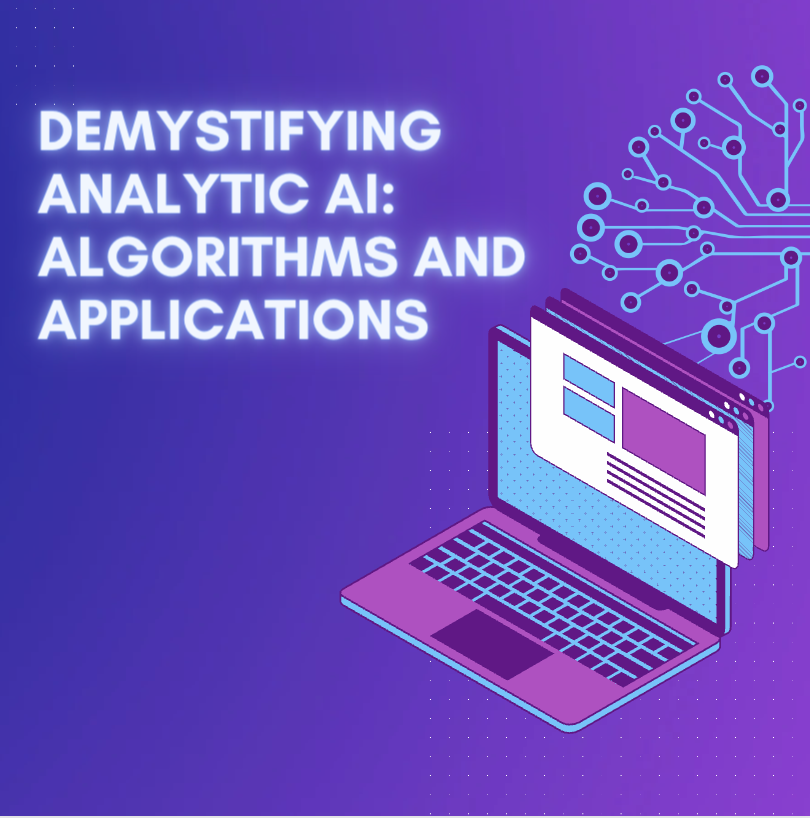
01 Sep Demystifying Analytic AI: Algorithms and Applications
In the expansive domain of Artificial Intelligence (AI), Analytic AI emerges as a cornerstone, wielding sophisticated algorithms to decipher the complexities hidden within both large and small datasets. This domain of analytics revolves around making data and analytics-informed decisions through the intricate analysis and interpretation of data. This article compares Machine Learning and Deep Learning and then looks at specific applications of each type of algorithm.
Algorithms Powering Analytic AI
Analytic AI harnesses the power of advanced algorithms to make sense of complex datasets. These algorithms can be broadly categorized into:
- Machine Learning Algorithms:
Machine Learning algorithms enable systems to learn from data and gain new insights from the analysis. There are many types of machine learning applications, but the top two for marketers are time series regression/ predictive analytics and logistic regression. They have significantly improved traditional statistical methods to provide better answers to critical marketing decisions:
- Time series regression, also known as Linear Regression, is now enhanced through machine learning techniques to squeeze even more information out of the data. For example, given a specific marketing mix for a large client, the amount of sales to be contributed by marketing could be $100M in the next 90 days.
- Logistic regression is used to predict the likelihood of an event occurring. For example, based on past behavior and other demographic information, the logistic regression model might indicate that a consumer will have an 87% probability of converting within the next 90 days. Or another customer might have a 20% chance of churning in the next 30 days.
- Deep Learning Algorithms:
Deep Learning involves neural networks with multiple layers that can automatically learn intricate patterns from data. Convolutional Neural Networks (CNNs), a form of deep learning, are integral in image recognition. Applications include analyzing social media images to understand customer sentiment towards a product. These neural networks are a game-changer for image analysis. Analyzing user-generated content, such as images and videos featuring a brand’s products, can be pivotal in marketing. CNNs can automatically detect and categorize objects in these visuals, revealing how consumers engage with the brand visually.
Applications of Analytic AI in Marketing
Analytic AI is revolutionizing marketing strategies in various ways:
- Predictive Analytics for Lead Scoring:
Analytic AI can predict the likelihood of a lead becoming a paying customer by analyzing historical data on leads and conversions. This enables sales and marketing teams to focus on leads with the highest potential. For example, a software company can prioritize leads exhibiting behaviors similar to previously converted customers. In the world of sales and marketing, predicting the likelihood of a lead converting to a customer is invaluable. Analytic AI can analyze historical lead data and interactions to create predictive models.
- Content Optimization:
Analytic AI can analyze the performance of different content pieces across various platforms and recommend optimizations. For instance, if a specific type of video content receives higher engagement on social media, AI can suggest creating more videos in a similar style. Content is vital in marketing, and Analytic AI can fine-tune content strategies. Marketers can identify content types that resonate most with their audience by analyzing the performance of different content pieces on various platforms. If, for instance, a cosmetics brand discovers that video tutorials generate more engagement than written guides, they can allocate more resources to producing videos.
In conclusion, Analytic AI’s influence on marketing is undeniable. With algorithms that decipher patterns from complex data and applications that enhance customer experiences, marketing strategies are becoming more sophisticated and effective. Analytic AI is an innovation and a transformational force in the marketing landscape. By harnessing the capabilities of intricate algorithms, businesses gain the power to unearth meaningful insights from data, reshape strategies, and create impactful customer experiences. The fusion of technology and marketing holds immense potential. As Analytic AI evolves, it will continue revolutionizing how businesses understand, engage with, and cater to their audiences, marking an era of data-driven creativity and precision in marketing. Tune in next week for an article about the Advantages of Analytic AI.
Want to know more?
Want to know more? Visit prorelevant.com to find out how you can customize your marketing efforts.
Check out my previous articles about Marketing KPIs and The Intersection between Generative and Analytic AI.
References
“About Linear Regression.” IBM, www.ibm.com/topics/linear-regression. Accessed 30 Aug. 2023.
“Convolutional Neural Networks (CNN) and Deep Learning.” Intel, www.intel.com/content/www/us/en/internet-of-things/computer-vision/convolutional-neural-networks.html. Accessed 30 Aug. 2023.




No Comments